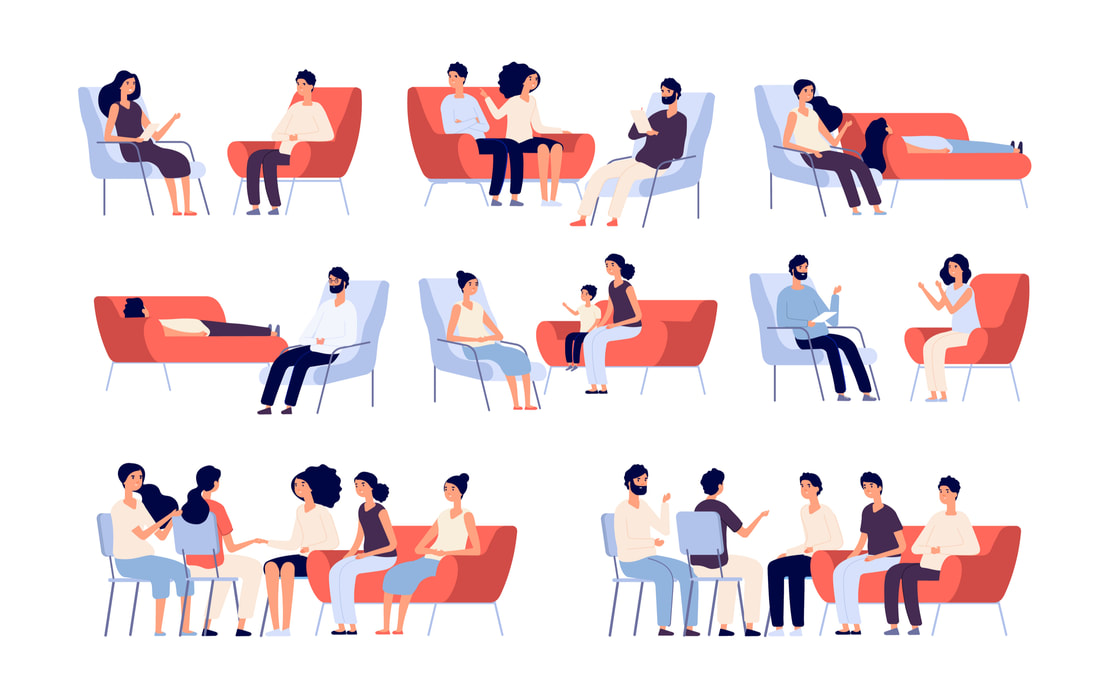|
There are lots of ways to think about what happens when you start counseling for mental health or behavior supports. However, one thing to keep in mind is that what you and your therapist are focused on will most likely change over time. When we break this change down we can see 5 different stages of therapy.
The first stage is relationship building. When you start therapy you are meeting someone brand new. A therapist is there to be a guide and to help you discover your own goals and abilities. However, in order to do this effectively your therapist will need to find out what is important to you, and you will need to find trust in your therapist. Relationship building can happen very quickly or it may take some time. While we often want change to happen quickly, remember that taking time to build a professional relationship will create a strong foundation for the other stages of therapy to build on. The second stage is assessment. Sometimes we start counseling because we have a specific question or concern we want to address. Sometimes we start counseling because we know we just don’t feel right or we feel overwhelmed. Either way therapists may need to do some assessments in order to fully understand what challenges you would like to overcome. Just like relationship building, these assessments might happen quickly or they may take some time. Taking the time to do assessments allows therapists to learn more about you and clarify what concerns and supports might be the best fit for you. The third stage is goal setting. Once you and your therapist understand each other and know how best to work together it is time to put goals down on paper.
The fourth stage is intervention. This stage is normally the longest and where the majority of the work is done. Every individual is going to have a different experience during this stage because every individual wants and needs slightly different things. Sometimes people meet their goals in a few sessions. Other times meeting goals can take several months. Each experience is okay! There is no one size fits all therapy. As long as you are feeling supported and doing hard but important work, you are on the right track. The fifth and final stage is termination. Just as no feeling lasts forever, no therapeutic relationship lasts forever either. Maybe you have met your goals, maybe your therapist is moving locations, or maybe you are moving to a new chapter in your life. Maybe it’s time to work with a new therapist who can support you in a different way. No matter the reason, therapy relationships do come to an end. And that can be a very good thing! Even if you have more goals and more work you would like to do — ending a therapeutic relationship with your counselor can be a milestone that shows you just how far you have come! It is important to remember that while all these stages should happen in therapy, they can often be hard to distinguish between. You might have two or three stages happen in the same session. You might also move back and forth between stages. Maybe after a period of time you need to set new goals, or your therapist might want to learn more about your life through another assessment. The five stages of therapy are a good guideline to help you understand what might happen when you start therapy — but guidelines aren’t hard and fast rules. What is most important is working together to see changes that matter to you!
2 Comments
4/14/2023 01:04:37 pm
It's great that you elaborated on what we'd expect from going to therapy. I'm interested in finding a therapist to help me get through a rough breakup that really affected me, and I think your advice will help reduce my anxiety about it. Thank you for the information on setting goals when working with a therapist.
Reply
9/26/2023 12:15:10 am
This article on what to expect when starting therapy is a valuable resource. It provides insights that can help individuals feel more comfortable seeking the support they need. Great work in breaking down the process!
Reply
Leave a Reply. |
Categories
All
Archives
July 2024
|
We Provide Services 24/7
Administrative Office Hours:
Monday - Friday
8:00 am - 5:00 pm
Phone: 720.684.6102
[email protected]
Fax: 303.261.8216
Mailing Address:
606 Mountain View Ave.
Longmont, CO 80501
Click to set custom HTML
© 2023 All RIGHTS RESERVED PRIVACY POLICY


 RSS Feed
RSS Feed